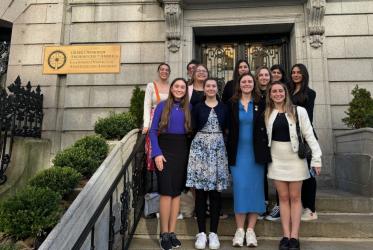I chase it, or perhaps the Holy Spirit pushes me toward it, but it has always seemed to me that it was an ideal we strive for; a mandate from Christ.
When I studied at the Ecumenical Institute I was introduced to the theological assertion that as Christ prayed to the Father that we “may be one” that there is, in fact, Christian unity as a theological “given.” We are already one faith and the work of the ecumenical movement is towards the visible unity of one faith.
I don’t know that I agree, but how do you argue with your esteemed professors from the World Council of Churches? Surely they would know much more about Christian unity than a pastor from Ohio, United States of America!
I joke, but I do find that I have a curiosity about the nature of Christian unity. Is it a mandate by Christ, beyond the possibility of humankind but possible by the Spirit which makes a way out of no way? Is it a theological assertion; a truth yet to be made visible? I find that I have situated myself liminally between the two. Christ said “The glory that you have given me I have given them, so that they may be one, as we are one, I in them and you in me, that they may become completely one.” (John 17: 22-23) While the scripture seems clear here, it runs against my lived experiences, it seems almost impossible to perceive. A childhood saying bounces around my head: “It is what it is, and it ain’t (is not) what it ain’t (is not).” Christian Unity seems to me something that both is and ain’t.
I find the same curiosity about the 2022 Global Ecumenical Theological Institute theme “Christ’s Love (Re)moves Borders.” Is it a mandate, or is it a theological assertion of fact? My curiosity again situates me in-between. I truly believe, and have experienced, Christ’s transformative love move and remove borders but in ten months of living with Christians from around the globe, I never fully experienced the institution of Christ’s love, communion, with all of my classmates. My country’s name, the United States of America, seems increasingly a misnomer as deep divisions are felt and seen in nearly every aspect of modern life. As I write this, our country flies its flag at half-mast because 21 people were murdered in an elementary school, but even our grief is not unified. We cannot even grieve together.
Christ’s Love (Re)moves Borders: Is it a mandate or a fact? Either way it is prophetic.
You may level at me the same criticism that Paul leveled at the Corinthians: “Has Christ been divided?” but just as surely I ask you if the Body of Christ has fully been united. It both is and it ain’t.
Herbie Hancock, famed Jazz pianist, tells a story about playing a concert in Stockholm with legendary Jazz trumpeter Miles Davis. While Davis is about to reach the climax of his solo Hancock plays the wrong chord. It “sounded like a complete mistake.”
Miles Davis paused for a second and played notes which made Hancock’s “wrong” chord, right. Davis didn’t hear it as a mistake, but heard it as something that happened. Jazz is a conversation and Davis was an exceptional listener.
In the conversations that will occur at the 11th Assembly of the World Council of Churches, I pray that we are exceptional listeners. In my experience of preaching, pastoral care, and listening to jazz I have learned that as much is said in the silences and absences as is said in the substance of a conversation. I pray we are attentive to what is said and left unsaid in the conversation; I pray we are attentive to the borders we acknowledge and those which we have yet to discuss. I pray we play notes that make the wrong chords right.
Whether “Christ’s Love (Re)moves Borders” is a mandate or a theological truth I am not entirely sure if there is a practical difference between the two. Either way it requires deep listening from us. Either way it requires action from us. Either way it is a gargantuan task for the churches.







